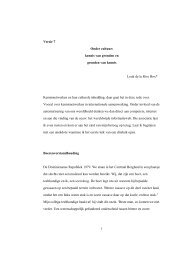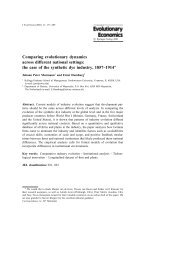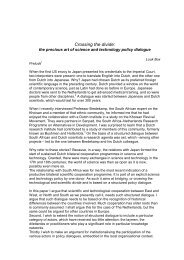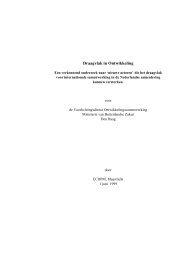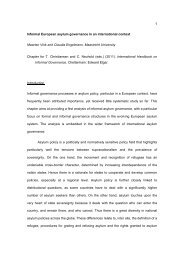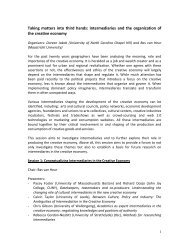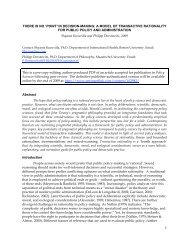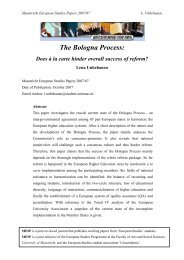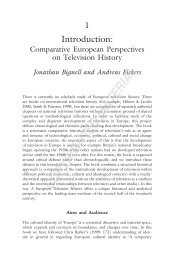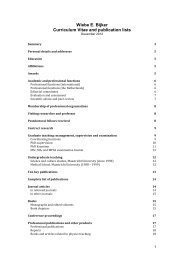Winds of Change: The Europeanization of National Foreign Policy
Winds of Change: The Europeanization of National Foreign Policy
Winds of Change: The Europeanization of National Foreign Policy
You also want an ePaper? Increase the reach of your titles
YUMPU automatically turns print PDFs into web optimized ePapers that Google loves.
Maastricht European Studies Papers 2007/01 Bennet Strang<br />
considering, firstly, “…competing centres <strong>of</strong> influence…” (Manners/ Whitman, 2000, p. 244)<br />
in the European post-modern setting, which, secondly, are at the heart <strong>of</strong> and contribute to the<br />
increasing blurring <strong>of</strong> the previously clear demarcation <strong>of</strong> what constitutes the ‘domestic’ and<br />
the ‘foreign’ sphere 16 even in high politics, i.e. foreign policy 17 (Sjursen, 1999; Manners/<br />
Whitman, 2000; Wong, 2005). Before elaborating upon the facets <strong>of</strong> the <strong>Europeanization</strong> <strong>of</strong><br />
foreign policy in-depth, an attempt to define this phenomenon has to be made first.<br />
4.1 Defining ‘<strong>Europeanization</strong> <strong>of</strong> <strong>Foreign</strong> <strong>Policy</strong>’<br />
“‘<strong>Europeanization</strong>’…can be a useful entry-point for greater understanding <strong>of</strong> important<br />
changes occurring in our politics and society. <strong>The</strong> obligation <strong>of</strong> the researcher is to give it a<br />
precise meaning” 18<br />
Attributing a ‘precise meaning’ to <strong>Europeanization</strong> <strong>of</strong> foreign policy is, indeed, not such an<br />
easy task as it appears to be at first sight, since there is no common definition (Smith, 2003).<br />
It is pivotal not to equate the perception <strong>of</strong> the <strong>Europeanization</strong> <strong>of</strong> ‘less sensitive’ policy areas<br />
with the degree and characteristics <strong>of</strong> the same phenomenon in the field (and special case) <strong>of</strong><br />
foreign policy. Thus, member states will not readily agree to a transfer <strong>of</strong> competences and,<br />
thereby, sovereignty to Brussels in this prestigious domain (Sjursen, 2003), as they probably<br />
would and have more easily done in low politics areas 19 , such as environmental policy.<br />
Nonetheless, the features <strong>Europeanization</strong> processes <strong>of</strong> both low and high politics have in<br />
common are incrementalism, the concern about domestic adaptation to EU decision-making,<br />
norms and atmosphere 20 and “…the political and policy changes caused by the impact <strong>of</strong><br />
16 This is to say that due to the <strong>Europeanization</strong> process, European policy is nowadays increasingly<br />
perceived <strong>of</strong> as being part <strong>of</strong> domestic policy, leading to a situation in which it “…is no longer<br />
possible to make a clear distinction between European foreign and domestic policy…” (Manners/<br />
Whitman, 2000, p. 44).<br />
17 However, the <strong>Europeanization</strong> <strong>of</strong> foreign policy can at this point in the paper already be said to<br />
represent a special case, as it is “…not just another public policy” (Torreblanca, 2001) area in which<br />
<strong>Europeanization</strong> takes place. This view will further manifest itself in the course <strong>of</strong> the paper.<br />
18 (Featherstone, 2003, p. 3)<br />
19 Even in the field <strong>of</strong> the Common <strong>Foreign</strong> and Security <strong>Policy</strong> (CFSP), which can be seen both as an<br />
expression <strong>of</strong> concerted action in the sensitive foreign policy domain and “…a process <strong>of</strong><br />
‘Europeanisation’ <strong>of</strong> foreign policy…” (Sjursen, 2003, p. 15), member states still vigorously affirm<br />
their central decision-making prerogatives by having subjected CFSP decision-making to<br />
intergovernmental unanimity. Thus, the perception <strong>of</strong> <strong>Europeanization</strong> <strong>of</strong> foreign policy as being a<br />
vertical and hierarchical top-down process embedded in a principal-agent structure (de Flers, 2005) is<br />
considered by member states to be absolutely beyond the pale. This, in turn, does not neglect the<br />
CFSP’s transformative impact on their foreign policies, which is limited as far as the socialization <strong>of</strong><br />
policy makers in a European sense is concerned, inter alia inhibiting “…the EU to act decisively”<br />
(Manners/ Whitman, 2000, p. 80; Sjursen, 2003; de Flers, 2005)<br />
20 One <strong>of</strong> the earliest definitions <strong>of</strong> <strong>Europeanization</strong> has been put forward by Ladrech, accounting for it<br />
as “…‘a process reorienting the direction and shape <strong>of</strong> politics to the degree that EU political and<br />
8



